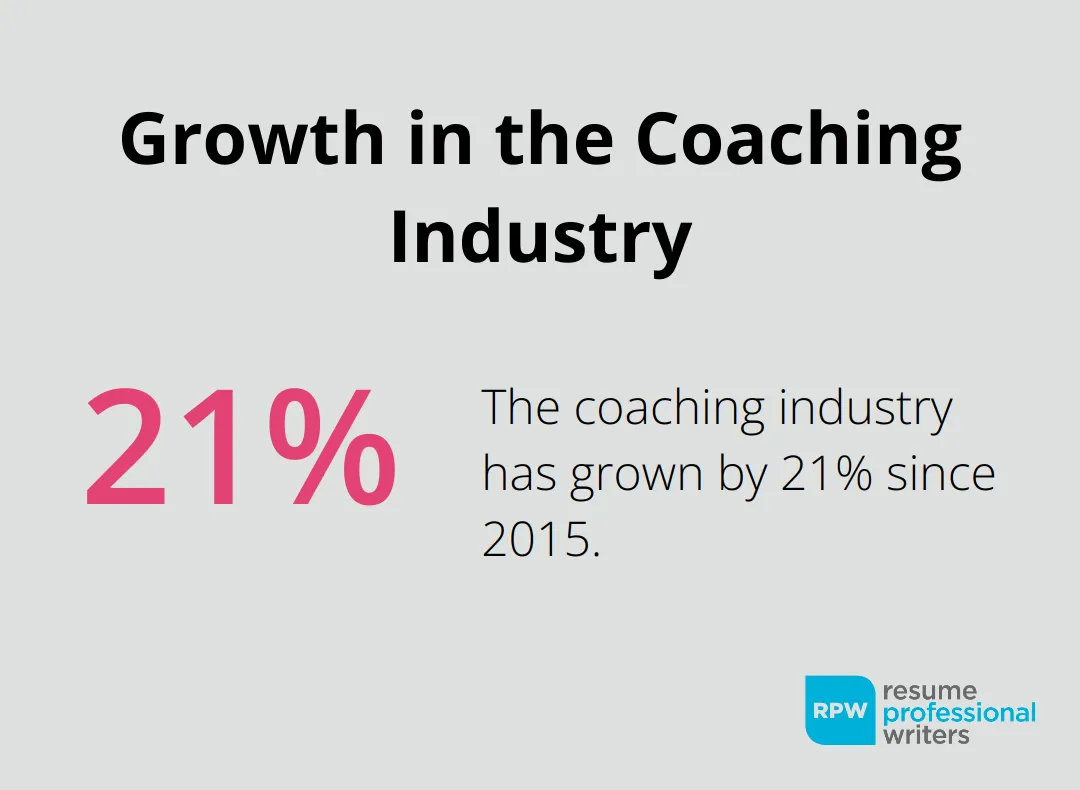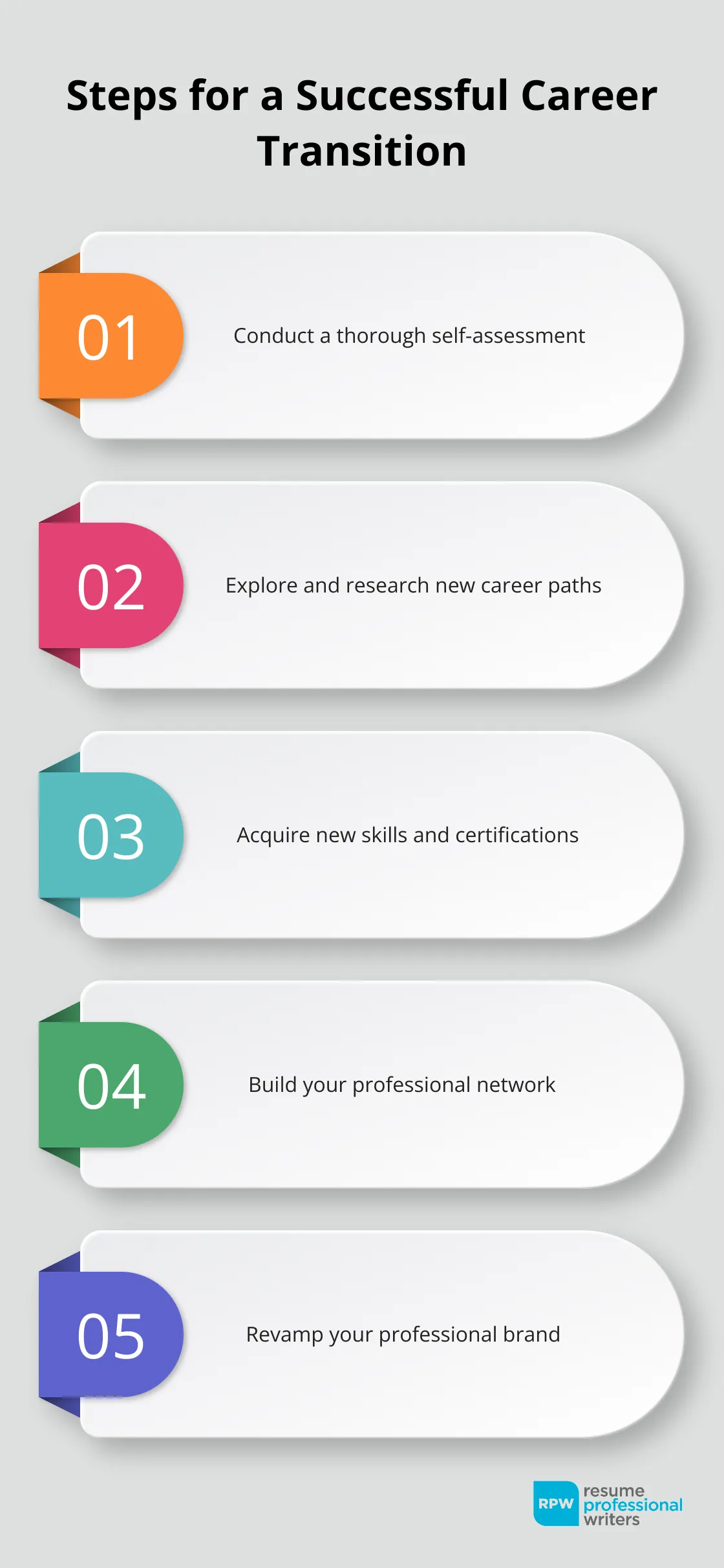As a therapist, you already have a unique set of skills that can open doors to exciting career opportunities. The thought of switching to a new path may feel both exciting and intimidating, but with the right approach, you can turn your expertise into a valuable asset in a completely new field.
In this post, we’ll explore some career change ideas for therapists that could be a great fit for you. We’ll show you how to recognize the transferable skills you’ve developed and give you practical steps to make your transition smoother.
Exploring New Horizons: Alternative Careers for Therapists
Therapists possess a unique skill set that can be applied to various professional fields. At Resume Professional Writers, we have seen numerous therapists successfully transition into rewarding alternative careers. Let’s explore some exciting options that leverage your therapeutic expertise.
Life and Career Coaching
Life and career coaching presents a natural progression for many therapists. This field allows you to continue helping individuals achieve personal and professional growth. The coaching industry has grown by 21% since 2015, with an average annual salary of $62,500 for life coaches in the United States (International Coach Federation). To transition into this role, you should obtain a coaching certification from organizations like the International Coach Federation or the International Association of Coaching.

Corporate Wellness Consulting
The corporate wellness market is booming, with projections to reach $87.3 billion by 2026 (Grand View Research). As a corporate wellness consultant, you can apply your mental health expertise to improve employee well-being and productivity. Many companies now prioritize mental health support, creating a growing demand for professionals with your background. To break into this field, you should familiarize yourself with workplace wellness trends and obtain certifications in areas like stress management or mindfulness.
Human Resources
Human resources roles offer an excellent opportunity for therapists to utilize their interpersonal skills and understanding of human behavior. The U.S. Bureau of Labor Statistics projects a 7% growth in HR manager positions from 2019 to 2029 (faster than the average for all occupations). Your expertise in conflict resolution and emotional intelligence can be particularly valuable in areas like employee relations and talent development. To transition, you should pursue HR certifications such as the Professional in Human Resources (PHR) or take courses in HR management.
Educational Counseling
Educational counseling is one of the most rewarding career change ideas for therapists, especially if you enjoy working with students and young adults. In this role, you can support students in navigating academic challenges, career decisions, and personal development. The Bureau of Labor Statistics projects an 8% growth in school and career counselor positions from 2019 to 2029, making this a promising field for career changers. To pursue this path, you may need to obtain additional certifications or a master’s degree in school counseling, depending on your state’s specific requirements.
Nonprofit Program Director
Nonprofit organizations often seek professionals with strong interpersonal skills and a passion for social causes. As a program director, you can leverage your therapeutic background to develop and implement initiatives that address community needs. This role allows you to make a broader impact while utilizing your skills in communication, empathy, and problem-solving. To transition, try volunteering or interning with nonprofits to gain relevant experience and build a network in the sector.
Transitioning to a new career takes time and effort, but these alternative paths offer exciting opportunities for therapists to apply their skills in new contexts. In the next section, we’ll explore the transferable skills that make therapists valuable candidates in these and other fields.
Skills That Make Therapists Valuable in New Careers
Therapists possess a unique set of skills that are highly transferable to various professional fields. Let’s explore the key competencies that make therapists stand out in alternative roles.
Active Listening and Effective Communication
Active listening and communication form the foundation of a therapist’s toolkit, and these skills prove equally vital in many other professions. A study by the National Association of Colleges and Employers found that 73.4% of employers rated verbal communication skills as essential for job candidates. Therapists excel at understanding subtext, asking probing questions, and providing clear, empathetic responses. These abilities prove particularly valuable in roles such as human resources, where effective communication can improve employee relations and productivity.
Problem-Solving and Critical Thinking
Therapists possess a unique ability to analyze complex situations, identify underlying issues, and develop effective solutions. The World Economic Forum’s Future of Jobs Report highlights complex problem-solving as one of the top skills needed in today’s workforce. This makes it an excellent fit for career change ideas for therapists, especially in fields like management consulting. In this role, professionals must quickly assess organizational challenges and propose strategic solutions. By leveraging their strong analytical skills, a therapist-turned-consultant could help businesses improve team dynamics and boost overall performance, creating a powerful impact in a new career path.
Emotional Intelligence in Professional Settings
Emotional intelligence (EI) is a key attribute of successful therapists, and it’s increasingly recognized as a vital skill in the business world. A study by TalentSmart revealed that 90% of top performers have high EI. This ability to understand and manage emotions proves particularly valuable in leadership roles. In a corporate wellness consulting position, a former therapist can use their EI to design effective stress management programs and foster a positive work environment.

Crisis Management Expertise
Therapists are adept at handling high-stress situations and emotional crises, a skill set that aligns perfectly with several career change ideas for therapists. This ability to remain calm and make sound decisions under pressure is highly sought after in roles that require quick thinking, such as emergency management or corporate crisis communication. A therapist’s experience with de-escalation techniques and trauma-informed approaches can provide significant value in these high-stakes environments, where maintaining composure and managing stress is crucial to success.
Professional Ethics and Confidentiality
Therapists adhere to strict ethical guidelines and confidentiality requirements, skills that are highly prized across various industries. A survey by the Ethics & Compliance Initiative found that 74% of employees faced pressure to compromise standards. Professionals with a strong ethical foundation (like therapists) can help organizations maintain integrity and build trust. This background benefits roles such as compliance officers or ethics consultants, where maintaining professional standards is paramount.
These transferable skills qualify therapists for a wide range of career opportunities. The next section will explore practical steps for a successful transition to a new career path, helping you leverage these valuable competencies in your chosen field.
Navigating Your Career Transition
Before embarking on your career transition, it’s essential to carefully consider several important steps that will significantly boost your chances of success. Here are some of them:
1. Conduct a thorough self-assessment.
Start your career transition by evaluating your skills, interests, and values. Use tools like the Strong Interest Inventory or the Myers-Briggs Type Indicator to gain insights into your personality and work preferences. These assessments can reveal career paths you might not have considered. For example, a therapist who scores high in leadership and organization might excel as a nonprofit program director.
Next, take a close look at your current skill set. Make a list of your therapeutic skills and think about how they can be applied in other industries. For example, your ability to maintain confidentiality is highly valued in roles like human resources, making it one of the top career change ideas for therapists. Consider creating a document that outlines your transferable skills, supported by specific examples from your therapy practice.
2. Explore and research new career paths.
After identifying potential career paths, research them thoroughly. Use resources like the Occupational Outlook Handbook from the Bureau of Labor Statistics to gather data on job growth, salary expectations, and required qualifications for different roles.
Conduct informational interviews to gain insider perspectives. Reach out to professionals in your target fields through LinkedIn or professional associations. Prepare specific questions about their daily responsibilities, industry challenges, and advice for career changers. These conversations will provide realistic insights and help you refine your career goals.
3. Acquire new skills and certifications.
Identify any skill gaps between your current expertise and the requirements of your target role. Online platforms like Coursera and edX offer affordable courses in various fields. If you’re interested in corporate wellness consulting, take courses in organizational psychology or workplace wellness program design.
Professional certifications can significantly boost your credibility in a new field. Research industry-specific certifications that align with your career goals. The International Coach Federation (ICF) offers respected coaching certifications, while the Society for Human Resource Management (SHRM) provides valuable HR certifications.
4. Build your professional network.
Networking plays a vital role in career transitions, especially when exploring career change ideas for therapists. By joining professional associations related to your target industry, you can connect with individuals who can offer valuable insights and opportunities. Attending industry conferences and local meetups is another excellent way to expand your network. For example, if you’re interested in educational counseling, attending events hosted by the American School Counselor Association can help you build connections in the field and open doors to new career possibilities.
Use social media platforms (especially LinkedIn) to expand your professional network. Share relevant content, engage in industry discussions, and connect with thought leaders in your target field. This visibility can lead to unexpected opportunities and valuable connections.
5. Revamp your professional brand.
Update your resume and LinkedIn profile to reflect your new career goals. Highlight transferable skills and relevant experiences from your therapy practice. Use industry-specific keywords to optimize your resume for applicant tracking systems (ATS).
Try creating a personal website or portfolio showcasing your expertise and thought leadership. This approach can be particularly effective for roles in consulting or coaching. Include case studies, articles, or presentations that demonstrate your ability to apply your therapeutic skills in new contexts.
Career transitions require time and persistence. Focus on your goals, remain open to learning opportunities, and seek professional guidance when needed. Your therapeutic background can become a unique asset in your new career path.

Final Thoughts
Therapists possess a wealth of transferable skills that open doors to numerous career change opportunities. From life coaching to corporate wellness consulting, these alternative paths allow therapists to leverage their unique expertise in new and impactful ways. The journey of exploring career change ideas for therapists requires careful planning, self-assessment, and strategic action.
Your therapeutic background sets you apart in many professional contexts, offering a valuable perspective in various industries. We encourage you to approach your career change with an open mind and a willingness to learn, as this journey may lead to unexpected and rewarding opportunities. Trust in the valuable skills and experiences you bring to the table as you embark on this exciting new chapter in your professional life.
Turn Your Career Change Goals into Reality with a Standout Resume
Making a career change as a therapist is a bold and exciting step, and a well-crafted resume can be the key to unlocking new opportunities. By strategically framing your therapeutic background in a way that resonates with hiring managers, you can position yourself as a strong candidate ready to thrive in a new professional landscape.
That’s where Resume Professional Writers can help. Our talented resume writers specialize in assisting career changers like you create resumes that capture attention and open doors. We are confident in our ability to translate your therapy experience into powerful achievements that fit your new path. Whether you’re moving into coaching, corporate wellness, HR, education, or nonprofit leadership, we’ll craft a resume that highlights your strengths, builds your confidence, and sets you up for success.
Partner with us and take the next step toward the career you’ve been envisioning.








